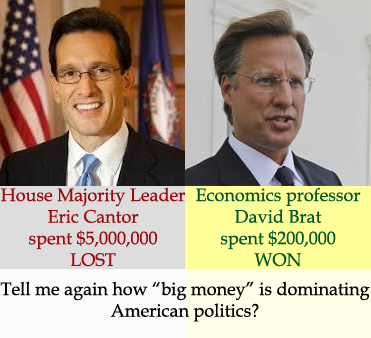I have written in the past about the misplaced concern about money in politics. (You can read the two main posts here and here.) To summarize, those who favor restricting spending in politics fail to ask the question, “If our government is being bought by ideological billionaires, who is selling it to them?” The answer of course is, the politicians themselves. The follow up question would of course be why are politicians being bought and the answer to that is because the politicians have given themselves the power to make or break businessmen, or anyone else for that matter. As they say in the gangster movies, “Nice business you’ve got here. It’d be a shame if something happened to it.”
Beyond these questions though, there is no evidence, as I pointed out in the first post linked above, that money has any great impact on election outcomes. If the examples of the multiple failed presidential bids by Steve Forbes and Ross Perot are not enough to illustrate this, two recent news stories should help do the trick.
The more recent of the two is the surprising upset in the Virginia Republican primary for the House of Representatives when House Majority Leader, the number two Republican in the House, lost to a relative unknown economics professor, David Brat. This was despite Cantor outspending Brat $5,000,000 to $200,000.
The second event took place a few weeks ago in Oregon. Rural Jackson County voted overwhelmingly (and violating the rights of others in the process) to ban all GMO crops. This was despite opponents of the legislation outspending the supporters by about $1,000,000 to $300,000.
Whatever you think of the results themselves, it should be obvious that the amount of money spent had no great impact on the outcome, giving lie to whole idea that “big money” is a corrupting influence. Money may help spread the ideas at issue, but the people still make up their own minds. Sometimes they choose in accordance with the facts of reality, sometimes against them.
(This second case also provides a clear example of just why businesses and wealthy individuals spend so much in trying to get their own message out and convince voters. How much money will the companies involved, not to mention the farmers that had decided that GMO crops were to best way for them to pursue their values, lose because a majority of people decided to violate their rights?)

